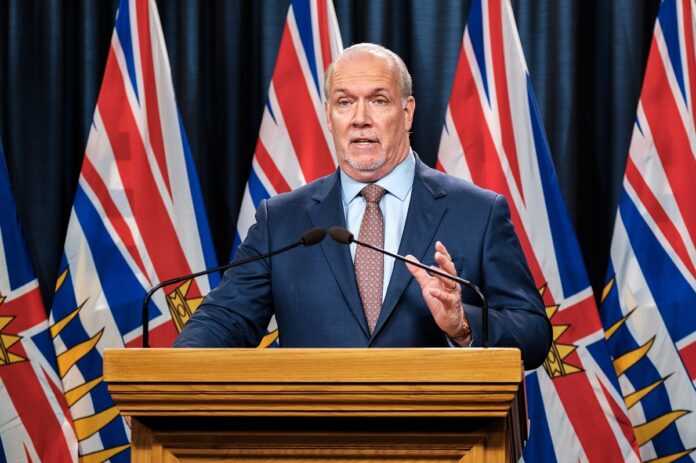THE Province announced on Monday that it is launching a stronger, more ambitious climate plan to deliver on its commitment to reduce climate pollution and build a cleaner, stronger economy for people throughout B.C.
The CleanBC Roadmap to 2030 plan accelerates measures in B.C.’s continent-leading climate plan that has been proven effective and introduces new ideas to help B.C. achieve the Paris emissions reduction targets for 2030 and reach net-zero by 2050.
“Here in B.C., the threat of climate change is no longer decades or even years away. The impacts are all around us, from devastating wildfires to intense heat waves and droughts,” said Premier John Horgan. “The scale of the climate emergency demands that we act with even greater urgency than ever before. By bringing people and businesses together, we can rise to the challenge and seize the opportunity to build a stronger, more resilient B.C. for everyone. That’s what this plan is all about.”
The CleanBC Roadmap to 2030 builds on the progress British Columbia has made since 2018 by making polluting more expensive and the shift from fossil fuels to clean alternatives more affordable. The plan will help power more businesses and communities with clean, renewable made-in-B.C. hydro electricity. Working with large industry partners, it will also ensure sector-specific plans to reduce their climate pollution and meet B.C.’s targets.
“By working with all sectors, we can see clearly where we are making progress and where new thinking and resources are required,” said George Heyman, Minister of Environment and Climate Change Strategy. “The CleanBC Roadmap puts greater focus on transitioning away from fossil fuels faster and adopting clean energy solutions. It strengthens B.C.’s position to attract investment and build opportunity for British Columbians and embodies our determination and commitment to meet our climate targets.”
The CleanBC Roadmap to 2030 includes a series of actions across eight pathways. They include:
* a commitment to increase the price on carbon pollution to meet or exceed the federal benchmark, with supports for people and businesses;
* requirements for new industry projects to have enforceable plans to reach B.C.’s legislated and sectoral targets and net zero by 2050;
* stronger regulations that will nearly eliminate industrial methane emissions by 2035;
* a comprehensive review of the oil and gas royalty system to ensure it aligns with B.C.’s climate goals and provides a fair return for British Columbians, with outcomes released in February 2022;
* new requirements to make all new buildings zero-carbon by 2030;
* a nation-leading adoption of zero-emission vehicles (ZEVs) by 2030 and 100% ZEVs by 2035;
* developing new ZEV targets for medium- and heavy-duty vehicles;
* an accelerated shift toward active transportation and public transit (30% by 2030; 40% by 2040; 50% by 2050);
* increased clean fuel and energy efficiency requirements; and
* support for innovation in areas like clean hydrogen, the forest-based bioeconomy and negative emissions technology.
“We made our oil and gas sectoral targets clear a year ago and this roadmap includes our commitments to meet that reduction target. We will work with experts, industry and Indigenous Nations on programs and policies that will achieve this, including regulation where necessary,” Heyman said.
“The CleanBC Roadmap updates B.C.’s climate and clean economy plan to put the province on a path that will cut pollution in line with our emissions targets and support affordability for people and businesses along the way,” said Colleen Giroux-Schmidt, vice-president of corporate relations, Innergex Renewable Energy Inc., and co-chair of B.C.’s Climate Solutions Council. “The plan incorporates extensive input from the independent Climate Solutions Council, and the challenge before us all now is to roll up our sleeves, harness all available resources and partners to ensure B.C. can navigate and thrive in the transition to a net-zero world.”
The CleanBC Roadmap was announced highlighting Seaspan Ferries recently completed pilot project supported through CleanBC to test the performance of biofuels in its cargo vessel, the Seaspan Reliant. The company is also working on a project which will increase the size of the battery storage systems onboard two of its vessels by means of a new battery technology developed by Corvus Energy at its facility in Richmond.
“Seaspan Ferries is making great progress reducing emissions across our fleet and CleanBC has been an important part of that,” said Ian McIver, President, Seaspan Marine Transportation. “This new biofuel and battery project has shown we can find innovative ways to lower greenhouse gas emissions and fuel consumption in our ships and get better engine performance and cost-savings. We’re confident the new CleanBC Roadmap will help us accelerate this transition and bring even more benefits.”
Quick Facts
* Actions in the roadmap will result in meeting B.C.’s legislated greenhouse gas (GHG) target of 40% below 2007 levels by 2030.
* The CleanBC Roadmap was a commitment from last year’s Climate Change Accountability Report and was informed by new emissions projections showing greater action to meet its 2030 GHG targets was required.
Learn More:
To read the CleanBC Roadmap to 2030, visit: www.cleanbc.gov.bc.ca
Read more about B.C.’s comprehensive review of the oil and gas royalty system: https://news.gov.bc.ca/










